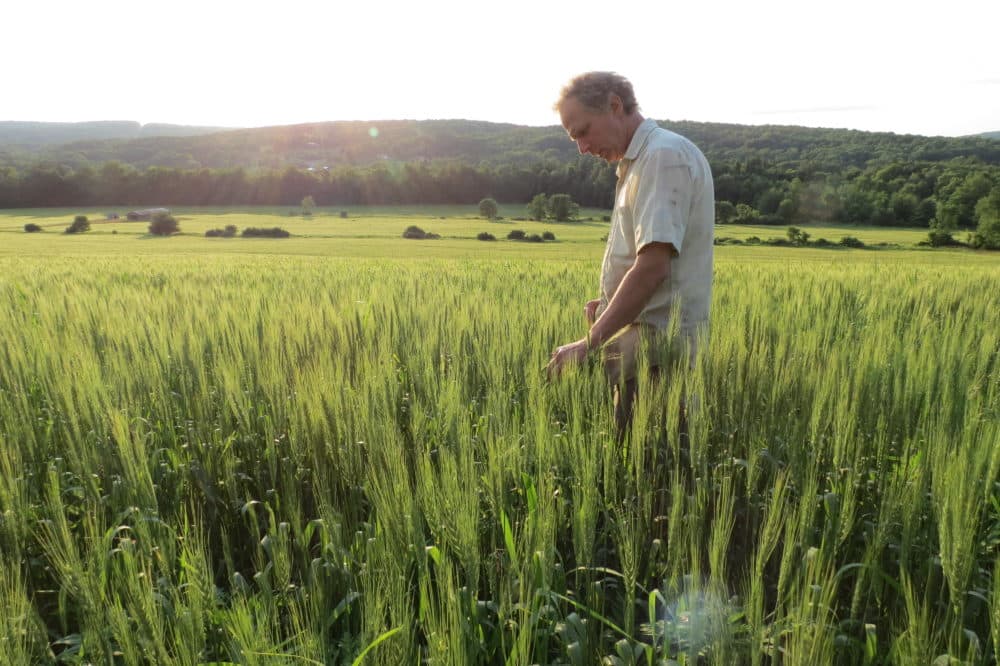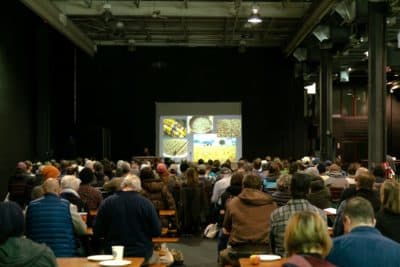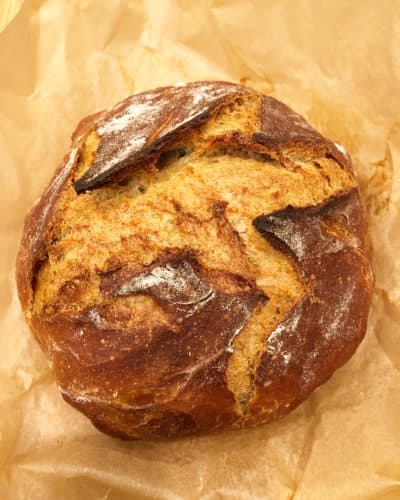Advertisement
The Beer, Booze And Bread Community Is Organizing A 'Northeast Grainshed'

If you watched the Super Bowl maybe you caught the Michelob beer commercial that begins with a shot of a lone farmer standing in a field. His grain silos are looming in the distance. Then the voiceover tells beer drinkers how their dollars can help conventional American farmers become organic ones.
“If every football fan picks up a six pack it’ll change farmland forever,” we’re told. Anheuser-Busch — the largest brewing company in the U.S. — promises to convert six square feet of grain acreage to organic for every half-dozen bottles of Michelob Ultra Pure Gold beer sold.
Turns out a regional group has been coming up with its own ways to connect beer back to farms — just on a much smaller scale. More than 200 craft brewers, farmers, distillers, maltsters and bakers came together last week in part to figure out ways to show consumers how and why the beer and bread they buy can make a difference. And they welcomed the Michelob commercial’s timing.
“I never felt so validated in all my life,” Barry Labendz of Kent Falls Brewing Company in Connecticut said after seeing the ad online before it played live. He decided to screen it on January 30 at an inaugural symposium for the new “small grains” group in formation called the “Northeast Grainshed.”
Andrea Stanley, founder of Valley Malt in Hadley, Massachusetts, started dreaming up the Grainshed idea about a year ago. When she and her husband opened their malt operation in 2010 the closest one was in Wisconsin. Brewers can't use raw grain harvested directly from farmers' fields to make beer. They rely on maltsters to convert raw barley and wheat (through germination and drying) into malt before it heads to the brewhouse.
Stanley, who also grows grain, said the Grainshed concept is a solution for actualizing conversations people have been having in small pockets across the industry.
“We're trying to move the needle forward in continuing to support local farmers to grow grains in the Northeast,” Stanley told me, “And what we've realized over the years in doing this work – where we're establishing mills and malt houses and breweries and bakeries – that the real bottleneck at this point is consumer awareness.”
Advertisement
A full day of panels and discussions on everything from marketing to sustainability unfolded in Canton at the Trillium Brewing Company's newly acquired 140,000 square foot facility slated to open in 2021. Addressing the disconnect between what people eat or drink and where ingredients originate was a dominant theme.

During his presentation, Labendz described a concept that echoes Michelob’s “6 For 6-Pack” campaign. He makes beer with 100% local grain at his farmhouse brewery and figured out a single can of his 6% IPA uses four square feet of field. Labendz shares this tangible conclusion with his customers. “Consumers and drinkers aren’t used to sitting at home and talking about the Grainshed — but they sure as hell open a lot of cans of beer,” Labendz said.
As for the group's name, Stanley compared the Grainshed to a watershed, “with a lot of tributaries flowing toward a larger body. Over the past decade people have expanded those tributaries,” she continued, adding it’s time to harness the rising industry’s momentum in an intentional, coordinated way.
Author, baker and self-described “Flour Ambassador” Amy Halloran concurred. “We're here to have the business community conversation about fostering further change,” she told the group, “We need to prime the public's imagination to understand the grain supply chain,” by drawing connections, “from the glass back to the ground and from the loaf back to the field.”
Halloran wrote, “The New Bread Basket,” which traces the local grain revival to when the Pilgrims arrived with their own wheat and rye. She believes the modern grain community needs to tell stories about what’s happening now, but also about what's been lost.

In the early 1900s small-scale mills could be found in every community. Then industrialization took commerce west and the farmers followed. Now infrastructure is returning to the northeast, with mills, malt houses, farms and retailers like Elmendorf Baking Supplies & Café in Cambridge sprouting up throughout the region.
But the flour and malt used by most craft brewers and bakers comes from industrial Midwest farms and are processed at massive flour mills and malting operations. Halloran wants everyone involved in the small grain ecosystem – including restaurateurs, chefs, and researchers – to unite and talk about moving forward.
Ingredients are important to craft beer drinkers, according to national Brewers Association chief economist Bart Watson. He suggested the Grainshed could take cues from hops, which American beer drinkers have fallen in love with over the past decade. “Beer consumers know the name of hops which they barely knew even existed 5-10 years ago,” Watson explained, adding the same could be done with different varieties of grain.
Allagash Brewing Company in Portland, Maine has embraced the “seed to glass" ethos. Founder Jason Perkins said its “16 Counties” beer is made with 100% local grain, and he told the group about Allagash’s goal to use 1 million pounds of local grain by 2021. Brewing with small production grain costs more, but Perkins said beer fans don’t seem to mind paying an extra 20 cents for a 16-ounce taproom pour.
A few bakers shared their experiences with the group, including Tony Rosenfeld of One Mighty Mill in Lynn, Massachusetts. He grinds grains grown in Linneus, Maine on-site and said when he and his business partner started making bagels with local wheat they needed a concise message that would inspire consumers. Now the phrase “Made with wheat you can eat” is on the packaging for One Mighty Mill bagels, pretzels and flour sold at Whole Foods, along with words on the company's role in a “small but mighty resistance against the homogenization and industrialization of food.”

Raising barley, wheat and other grains in the Northeast is also challenging. Researchers from the UVM, UMaine and Cornell have been trying to determine which “small grains” grow best in the region. Ellen Mallory of UMaine addressed the issue of scaling up.
“To make this work, we need enough growers, and enough production,” she said, “I’m really excited by this regional effort where we can create critical mass to move the needle.”
More than one person talked about the idea of grain production helping farmers find new sources of income, especially struggling dairy farmers.
Thor Oechsner of Oechsner Farms in Newfield, NY has been growing grains for beer, bread and spirits for more than 15 years and marveled at the symposium’s turnout. “I guess local grains have arrived,” he told me, “Granted, this is this incredibly small subset of the population – but a lot of people are touched by it. Now we're really drilling down and focusing on how we get the word out that this is local and it’s supporting land.”
With more than 150 breweries in Massachusetts alone there's a lot of potential for raising awareness in the beer community itself. Wormtown Brewery founder Ben Roesch challenged his peers to visit farms and pledge to use a certain percent of local grains in their beers. In 2010 he made “Masswhole,” his company's first beer with all local ingredients. Now all Wormtown beers have, “A piece of Mass in every glass,” Roesch said.
To highlight the Grainshed seven breweries collaborated to make a light, citrusy Grisette with Northeast grains from a few different maltsters. It’s being poured at Clover Food Labs (which uses 30% local wheat in their pita bread) and Row 34 in Boston and at The Dirty Truth in Northampton.
When asked about Michelob's Super Bowl ad Grainshed founding member Andrea Stanley mused, “The fact that an organization that has a multi-million-dollar budget for advertising came up with the same idea that we did in our little grassroots organization solidifies for us that we know what we need to do.” Just on a smaller, tastier level.
An earlier version this story said Barry Labendz grows about 800-acres of grain at his farmhouse brewery. That was incorrect. But he does use 100% local grain in his beers. We regret the error.

